
The EUCMOS meetings can be traced back to 1947, when Reinhard Mecke organized a congress under the auspicies of the informal European Molecular Spectroscopy Group, in Konstanz. However, the meeting that has since become regarded as the first EUCMOS was organized by Ernst Miescher in Basel, in 1951. Since then, every two years an EUCMOS meeting has been held in different places in Europe. The scientific excellence of the series makes EUCMOS one of the most important events in the field of Molecular Spectroscopy..
The following text is an updated version of the text "A Brief History of EUCMOS (European Congress on Molecular Spectroscopy)", written by A. J. Barnes and published as the Editorial of J. Mol.Struct. 563-564 (2001).
The European Molecular Spectroscopy Group, which was constituted informally after the Second World War to bring together spectroscopists from across Europe, met for the first time in Konstanz in1947 [1]. Reinhard Mecke was at the time working in temporary accommodation at Wallhausen, a small village on the shores of Lake Constance, and the meeting (initiated by invitation of Professors Lecomte and Kastler from Paris) was attended by French, German and Austrian spectroscopists [2].
However, the meeting which has since become regarded as the first of the EUCMOS series was organised under the auspices of Ernst Miescher in Basel in 1951, followed every two years by conferences in Paris (1953), Oxford (1955), Freiburg (1957), Bologna (1959), Amsterdam (1961), Budapest (1963), Copenhagen (1965) and Madrid (1967). As is often the case, the titles and numbering of the early conferences were not consistent with later practice. The 1955 Oxford conference was described in an account by Harold Thompson [1] as a (fourth) meeting of the European Molecular Spectroscopy Group. In the published proceedings of the 1959 Bologna meeting [3], the conference was referred to as the IVth Meeting on Molecular Spectroscopy of the European Committee on Molecular Spectroscopy. The plenary lectures of the 1961 Amsterdam meeting were published in Pure and Applied Chemistry under the now customary title (Vth) European Congress on Molecular Spectroscopy [4], and the following meeting in Budapest in 1963 was designated at the time as EUCMOS VI. However, the publications in Pure and Applied Chemistry arising from the 1965 Copenhagen and 1967 Madrid meetings [5,6] were entitled EUCMOS VIII and IX, thus by 1965 the retrospective numbering sequence shown in Table 1 had become established..
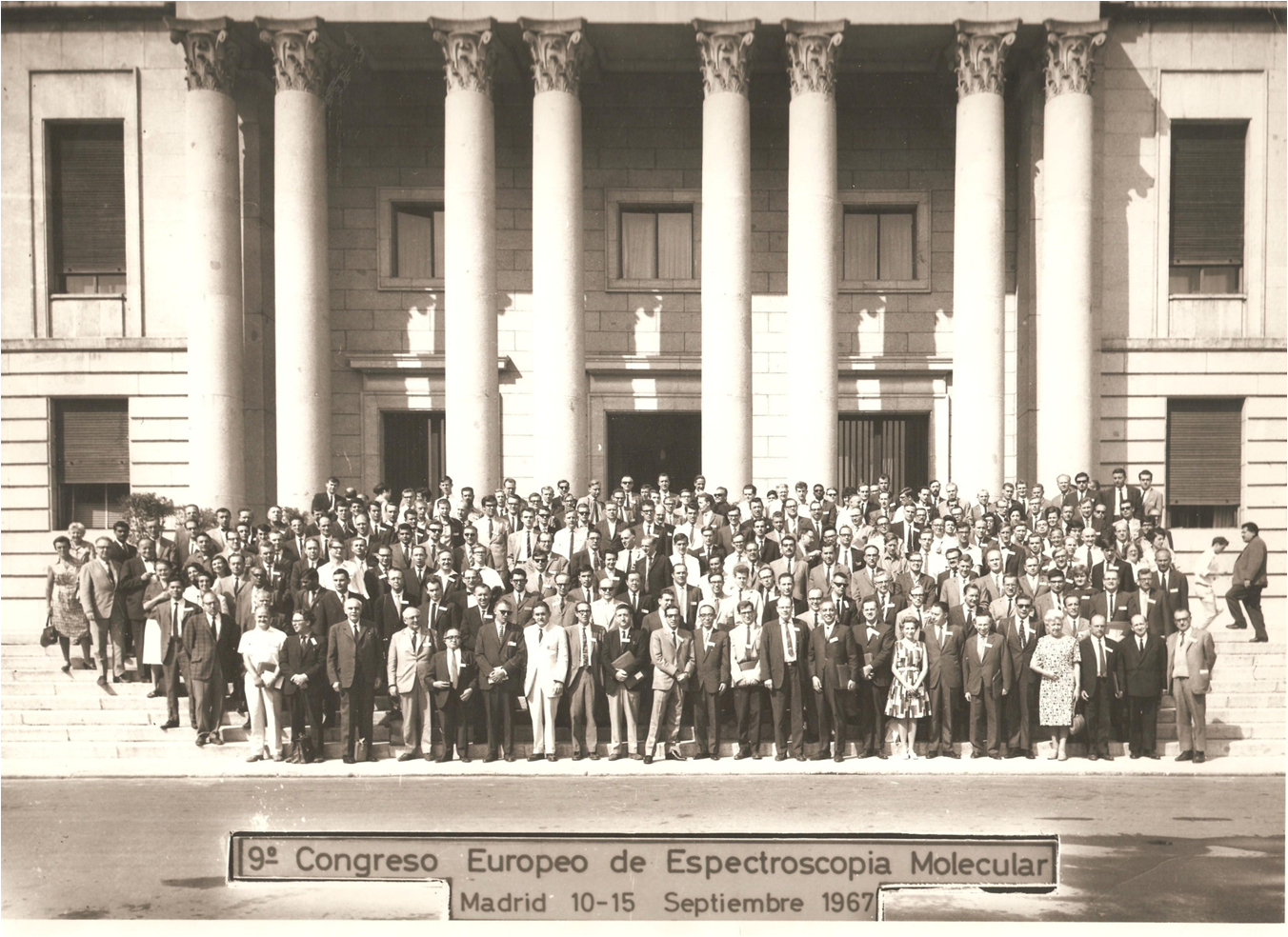 Group Picture - EUCMOS IX (Madrid, 1967)
Group Picture - EUCMOS IX (Madrid, 1967)
In 1969 a more specialized EUCMOS meeting, devoted to solid state optical spectroscopy, was held in Liége [7]. In the Preface to the proceedings volume, B. Rosen
(the Congress President) described the arrangement of EUCMOS meetings:
"In the course of a congress, ad hoc groups of colleagues make proposals as to where the next congress shall be held, and, according to a tradition which
is already old and venerable, the final decision is made by a committee presided over by Professors Alfred Kastler, Jean Lecomte and Sir Harold Thompson"
(the other pioneer of the EUCMOS meetings, Reinhard Mecke, died in 1969).
The next meeting was not held until 1973, when it was organised in Tallinn and similarly concentrated on solid state spectroscopy. The plenary lectures were
again published in Pure and Applied Chemistry [8].
The 1975 meeting in Strasbourg was devoted to the molecular spectroscopy of dense phases [9] and can be regarded as effectively the last organised by the founders
of EUCMOS in the manner described by Rosen (Jean Lecomte died in 1979 and Sir Harold Thompson in 1983).
The International Committee was considerably expanded at the 1977 meeting in Wroclaw and elected as its President Orville-Thomas who, supported by Müller and Ratjaczak,
continued to uphold the tradition of an independent EUCMOS organisation. A further innovation, following the 1979 meeting, was the inclusion of overseas representatives
on the International Committee in recognition of the significant number of scientists from outside Europe attending the conferences (Table 2). Also starting with
EUCMOS XIII (1977), the proceedings of each conference have been published in the Journal of Molecular Structure [10-30].
The regular pattern of meetings every two years was perturbed for the second time in 1991 when EUCMOS XX, which was due to be held in Zagreb, had to be cancelled
because of the civil war in Yugoslavia. The following meeting, in Vienna, was brought forward by a year and the meetings have since been held in the even years.
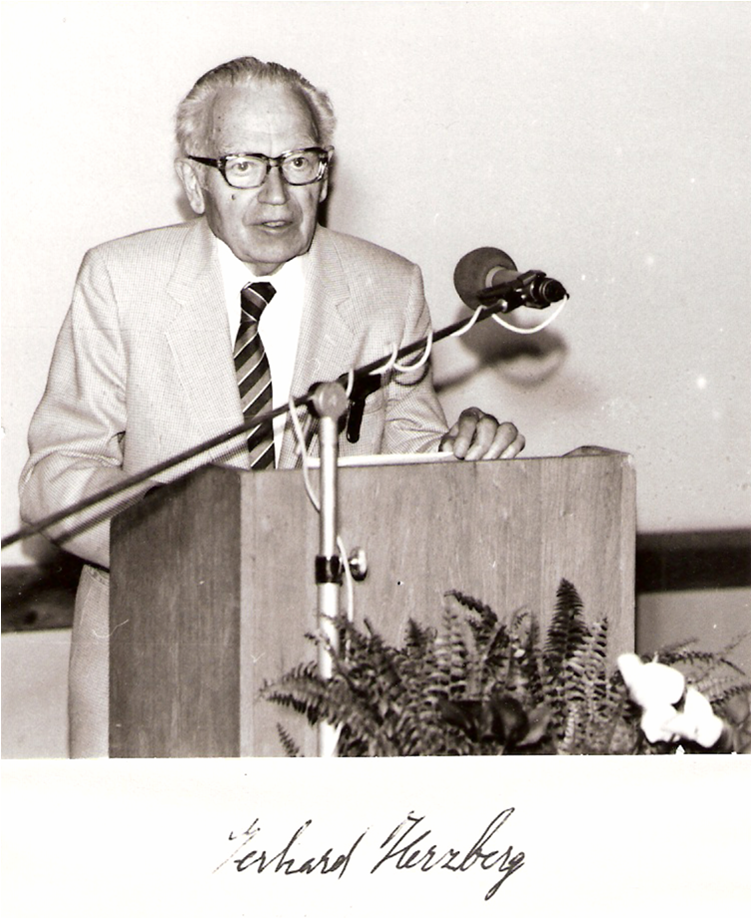 Gerhard Herzberg lecturing in his 85th year at EUCMOS XIX (Dresden, 1989)
Gerhard Herzberg lecturing in his 85th year at EUCMOS XIX (Dresden, 1989)
Table 1 - Calendar of EUCMOS Meetings
| Number | Year | Country | City | Organisers | ||
| 0 | 1947 | Germany | Konstanz | Mecke | ||
| I | 1951 | Switzerland | Basel | Miescher | ||
| II | 1953 | France | Paris | Lecomte/Kastler | ||
| III | 1955 | UK | Oxford | Thompson | ||
| IV | 1957 | Germany | Freiburg | Mecke | ||
| V | 1959 | Italy | Bologna | Mangini | ||
| VI | 1961 | The Netherlands | Amsterdam | Katelaar | ||
| VII | 1963 | Hungary | Budapest | Kovacs | ||
| VIII | 1965 | Denmark | Copenhagen | Bak | ||
| IX | 1967 | Spain | Madrid | Morcillo | ||
| X | 1969 | Belgium | Liége | Rosen | ||
| XI | 1973 | USSR | Tallinn | El'yashevich | ||
| XII | 1975 | France | Strasbourg | Lecomte | ||
| XIII | 1977 | Poland | Wrocław | Ratajczak | ||
| XIV | 1979 | Germany (FRG) | Frankfurt | Müller/Comes | ||
| XV | 1981 | UK | Norwich | Orville-Thomas | ||
| XVI | 1983 | Bulgaria | Sofia | Jordanov | ||
| XVII | 1985 | Spain | Madrid | Hidalgo | ||
| XVIII | 1987 | The Netherlands | Amsterdam | Oskam | ||
| XIX | 1989 | Germany (DDR) | Dresden | Steger | ||
| XX* | 1991 | Croatia | Zagreb | Meic | ||
| XXI | 1992 | Austria | Vienna | Kellner | ||
| XXII | 1994 | Germany | Essen | Schrader | ||
| XXIII | 1996 | Hungary | Balatonfüred | Mink | ||
| XXIV | 1998 | Czech Republic | Prague | Volka | ||
| XXV | 2000 | Portugal | Coimbra | Fausto | ||
| XXVI | 2002 | France | Lille | Turrell | ||
| XXVII | 2004 | Poland | Cracow | Handke/Ratajczak | ||
| XXVIII | 2006 | Turkey | Istanbul | Akyüz | ||
| XXIX | 2008 | Croatia | Opatia | Musić/Furić | ||
| XXX | 2010 | Italy | Florence | Schettino | ||
| XXXI | 2012 | Romania | Cluj-Napoca | Aştilean/Chiş/Cozar | ||
| XXXII | 2014 | Germany | Düsseldorf | Schmitt | ||
| XXXIII | 2016 | Hungary | Szeged | Palinko | ||
| XXXIV | 2018 | Portugal | Coimbra | Fausto | ||
| XXXV** | 2023 | Finland | Jyväskylä | Lundell | ||
| XXXVI | 2025 | Poland | Wroclaw | Orzechowski | ||
| XXXVII | 2027 | Spain | Malaga | López-Ramírez | ||
| XXXVIII | 2029 | Turkey | Istanbul | Ogruc-Ildiz |
* Not held because of the civil war in Yugoslavia. ** Postponed due to the COVID 19 pandemics and the invasion of Ukraine by the Russian Federation.
At EUCMOS XXII held in Essen (1994), Orville-Thomas retired as President of the International Committee and Barnes was elected to this post.
During his mandate, 11 conferences of the series were held, included the one organised in Coimbra in the Year 2000 (EUCMOS XXV). Over 370
scientists from 48 countries took part in that meeting, where the opening lecture was delivered by Sir Harold Kroto, the 1996 Chemistry
Nobel Prize winner [22]. During this period, the International Committee integrated the organisers of the different meetings for a period of four years, in an automatic rotating scheme.
The proceedings continued to be published in dedicated special issues of the Journal of Molecular Structure [23-31].
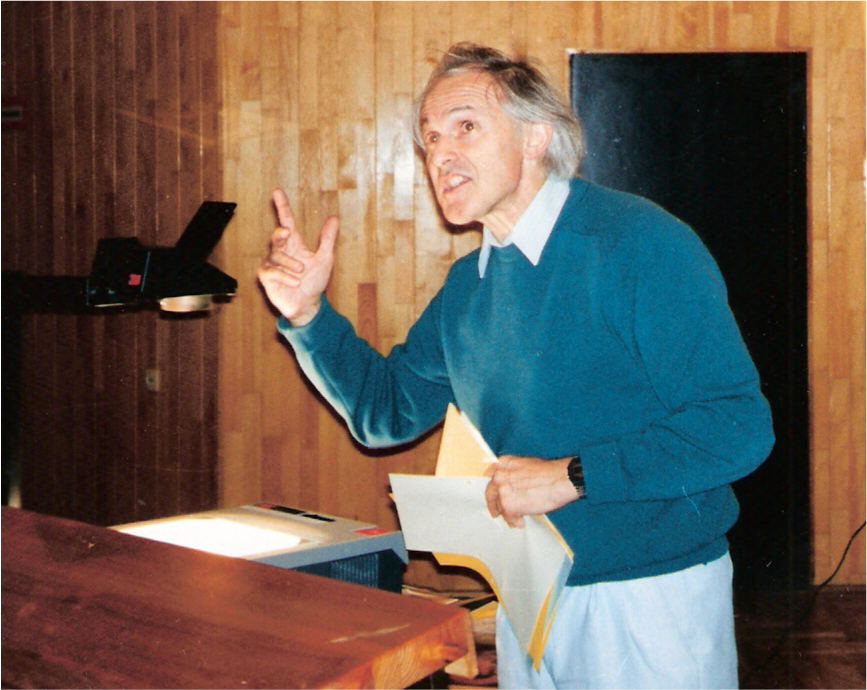 Sir Harry Kroto lecturing at EUCMOS XXI (Vienna, 1992). He also delivered the Opening Lecture of EUCMOS XXV (Coimbra, 2000)
Sir Harry Kroto lecturing at EUCMOS XXI (Vienna, 1992). He also delivered the Opening Lecture of EUCMOS XXV (Coimbra, 2000)
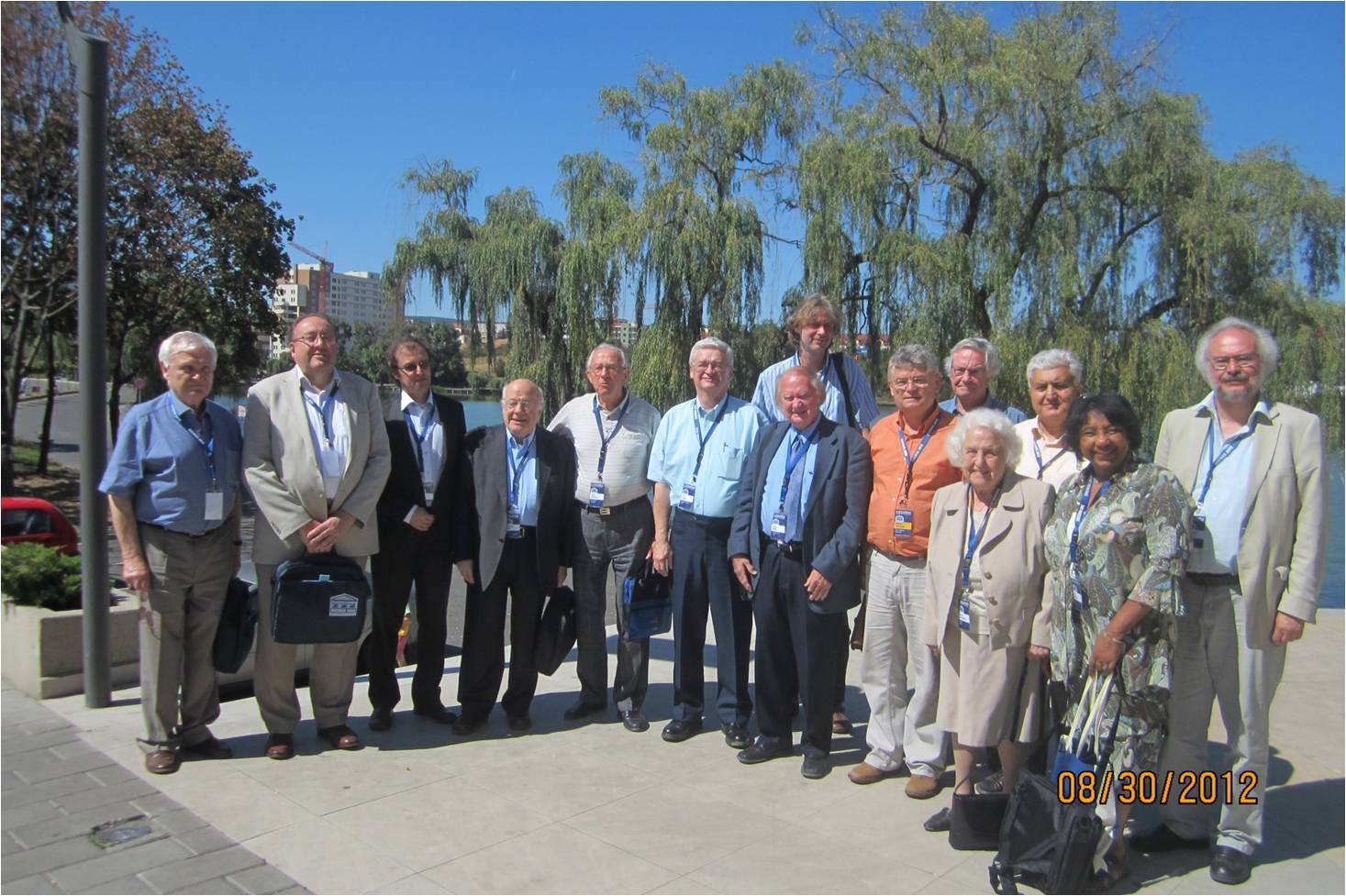 International Committee members - EUCMOS XXXI (Cluj-Napoca, 2012) - From left to right: Ratajczak, Barnes, Fausto, Zerbi, Mantsch, Laane, Schmitt,
Durig, Aştilean, Ford, Bellanato, Cozar, Turrel, Heise.
International Committee members - EUCMOS XXXI (Cluj-Napoca, 2012) - From left to right: Ratajczak, Barnes, Fausto, Zerbi, Mantsch, Laane, Schmitt,
Durig, Aştilean, Ford, Bellanato, Cozar, Turrel, Heise.
Table 2 - International EUCMOS Committees of 1975, 1981, 2000, 2008, 2018 and 2023
| 1975 | 1981 | 2000 | 2008 | 2018 |
|
H.W. Thompson (UK) J. Lecomte (France) F.J. Comes (Germany) M. El'yashevich (USSR) A. Hadni (France) B. Jezowska (Poland) I. Kovacs (Hungary) A. Mangini (Italy) S. Nikitine (France) K.K. Rebane (USSR) |
W.J. Orville-Thomas (UK) A. Müller (Germany) H. Ratajczak (Poland) A.J. Barnes (UK) A.R.H. Cole (Australia) S.J. Cyvin (Norway) J.R. Durig (USA) T.A. Ford (S. Africa) H.H. Günthard (Switz.) B. Jordanov (Bulgaria) I. Kovacs (Hungary) J. Lascombe (France) H.H. Mantsch (Canada) J. Morcillo (Spain) C.N.R. Rao (India) M. Tasumi (Japan) E.V. Titov (USSR) G. Zerbi (Italy) |
A.J. Barnes (UK) A. Müller (Germany) H. Ratajczak (Poland) J. Bellanato (Spain) J.R. Durig (USA) T.A. Ford (S. Africa) B. Jordanov (Bulgaria) J. Laane (USA) H.H. Mantsch (Canada) J. Mink (Hungary) C.N.R. Rao (India) M. Tasumi (Japan) E.V. Titov (Ukraine) S. Turrell (France) K. Volka (Czech Rep.) G. Zerbi (Italy) |
A.J. Barnes (UK) H. Ratajczak (Poland) R. Fausto (Portugal) S. Akyüz (Turkey) J. Bellanato (Spain) J.R. Durig (USA) T.A. Ford (S. Africa) K Furić (Croatia) M. Handke (Poland) J. Laane (USA) H.H. Mantsch (Canada) S. Musić (Croatia) M. Tasumi (Japan) S. Turrell (France) G. Zerbi (Italy) |
R. Fausto (Portugal) H. Ratajczak (Poland) M. Schmitt (Germany) A.J. Barnes (UK) J. Bellanato (Spain) J.R. Durig (USA) T.A. Ford (S. Africa) H. Hamaguchi (Japan) H.M. Heise (Germany) J. Laane (USA) H.H. Mantsch (Canada) I. Palinko (Hungary) S. Turrell (France) G. Zerbi (Italy) |
| 2023 - Steering Committee | 2023 - Honorary Committee |
|
R. FAUSTO (Coimbra, Portugal) - PRESIDENT S. TURRELL (Lille, France) - VICE-PRESIDENT M. SCHMITT (Düsseldorf, Germany) - VICE-PRESIDENT H. M. HEISE (Iserlohn, Germany) J. LUNDELL (Jyväskylä, Finland) K. ORZECHOWSKI (Wroclaw, Poland) L. BAÑARES (Madrid, Spain) M. BARANSKA (Cracow, Poland) S. BAYARI (Ankara, Turkey) C. CASTIGLIONI (Milan, Italy) A. G. CSÁSZÁR (Budapest, Hungary) M. CZARNECKI (Wroclaw, Poland) G. DOVBESHKO (Kiev, Ukraine) V. DECKERT (Jena, Germany) P. HERDEWIJN (Leuven, Belgium) G. OGRUC ILDIZ (Istanbul, Turkey) S. KAZARIAN (London, UK) H. KJAERGAARD (Copenhagen, Denmark) J. KNEIPP (Berlin, Germany) B. LENDL (Vienna, Austria) R. LÓPEZ-RAMIRÉZ (Malaga, Spain) T. MOMOSE (Vancouver, Canada) S. MELANDRI (Bologna, Italy) A. MEZZETTI (Paris, France) I. NEMEC (Prague, Czech Republic) S. RIEDEL (Berlin, Germany) R. ROMANO (La Plata, Argentina) M. SCHNELL (Hamburg, Germany) E. VENTURA DO MONTE (João Pessoa, Brazil) W. YANG (Durham, USA) W. J. BUMA (Amsterdam, Netherlands) |
J. BELLANATO (Madrid, Spain)* A. J. BARNES (Salford, UK)* J. R. DURIG (Kansas City, USA)* T. A. FORD (Durban, South Africa)* H. HAMAGUCHI (Hsinchu, Taiwan) J. LAANE (College Station, TX, USA) H. H. MANTSCH (Ottawa, Canada)* I. PALINKO (Szeged, Hungary)* H. RATAJCZAK (Wroclaw, Poland) G. ZERBI (Milan, Italy) * Deceased |
In EUCMOS XXXIII (2016, Szeged) Barnes retired as President of the International Committee and Fausto (vice-President since EUCMOS XXVII, Cracow,
together with Ratajczak) was elected to this position. It was a coincidence that the new President had already been chosen
as the organiser of EUCMOS 2018 (EUCMOS XXXIV), recently hold in Coimbra.
Turrel (who has been appointed during the meeting of the EUCMOS Steering Comitee hold in Coimbra) and Schmitt are the current vice-Presidents of the International Committee, which has been expanded in 2023
with appointment of several new members. At the same time, a Honorary Committee has been established.
The recent period of the history of EUCMOS was perturbed by the emergency of the COVID-19 pandemics and the invasion of Ukraine by the Russian
Federation, which led to the postponment of EUCMOS XXXV (Juväskylä, Finland) from the expected date of 2020 to 2023.
For 70 years, EUCMOS has been at the service of spectroscopy in Europe and in the world. The flourishing EUCMOS history is, probably, the best
example of how an independent association of scientists can result in a long-term successful series of events characterized by the excellence
of its scientific contents, sustained support to developments in spectroscopy, and stimulus to young researchers… all this, in the very
characteristic warm and stimulating social environment of the EUCMOS meetings.
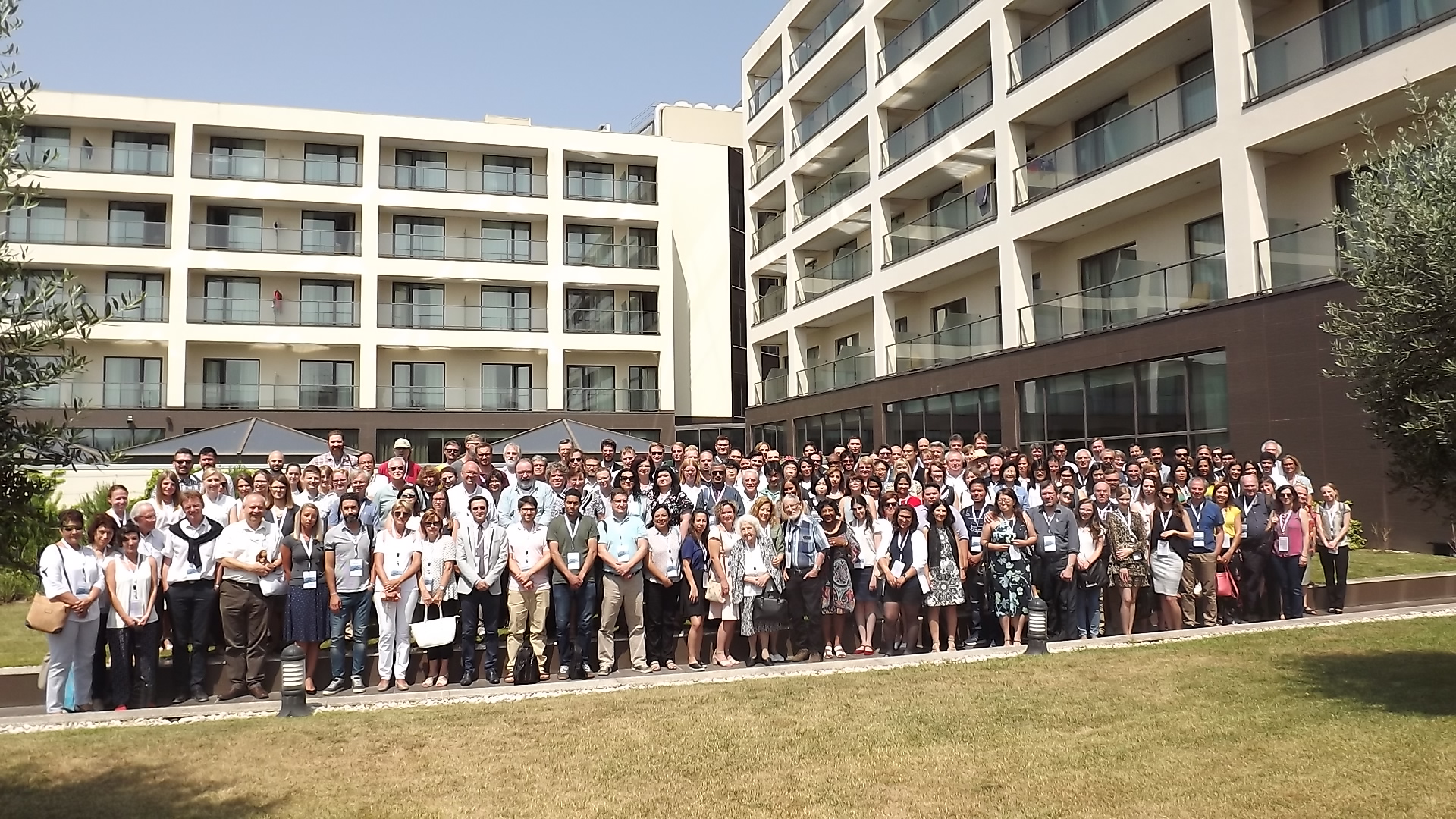 Group Picture - EUCMOS XXXIV (Coimbra, 2018)
Group Picture - EUCMOS XXXIV (Coimbra, 2018)
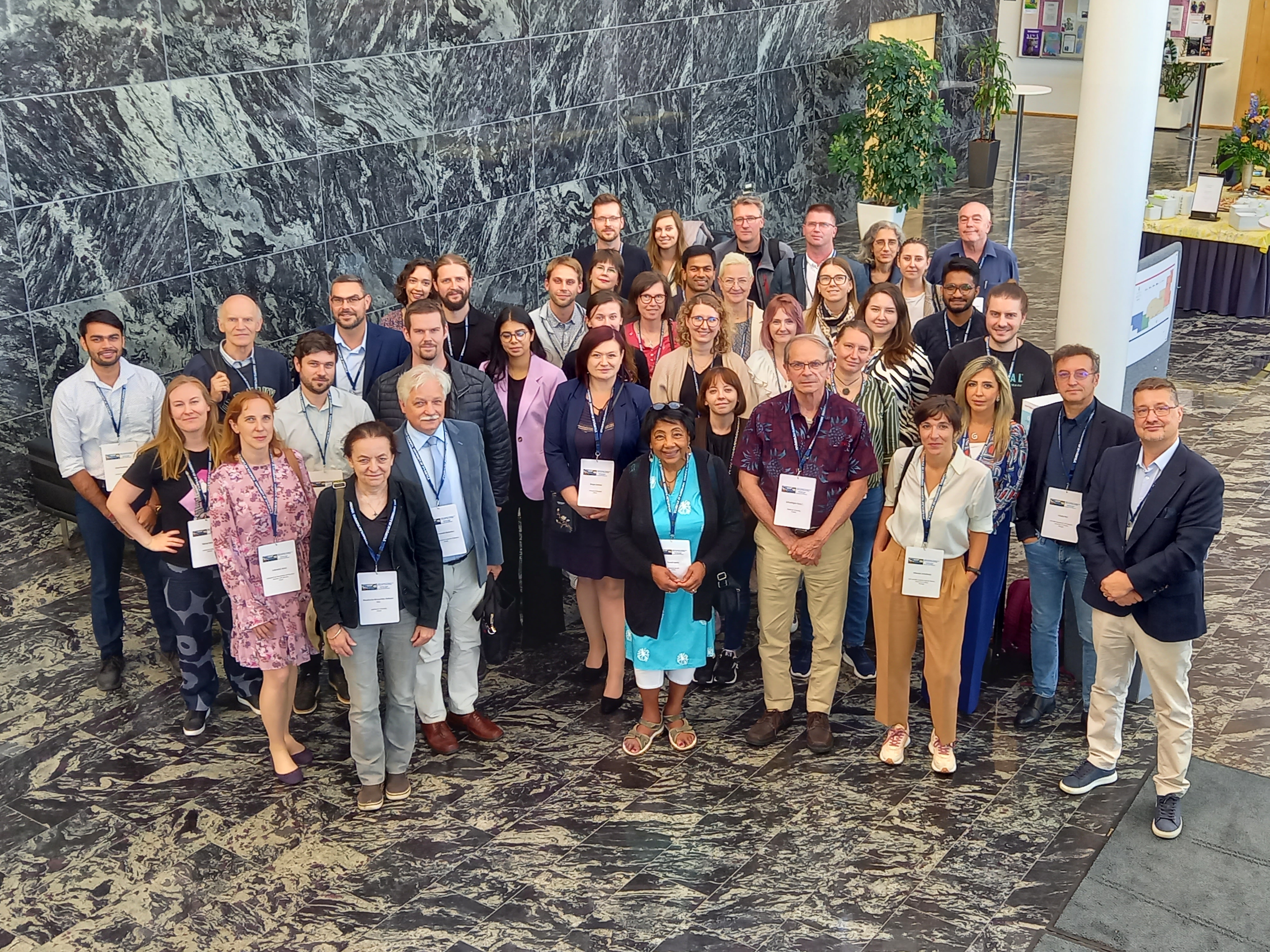 Group Picture - EUCMOS XXXV (Jyväskylä, 2023)
Group Picture - EUCMOS XXXV (Jyväskylä, 2023)
 Lecture Hall - EUCMOS XXXVI (Wroclaw, 2025)
Lecture Hall - EUCMOS XXXVI (Wroclaw, 2025)
[1] H.W. Thompson, Nature 176 (1955) 680-683.
[2] W. Lüttke, G.A.A. Nonnenmacher, Journal of Molecular Structure 347 (1995) 1-18.
[3] A. Mangini (Ed.), Adv. in Molecular Spectroscopy, vols. 1-3, Pergamon Press, Oxford, 1962.
[4] Pure and Applied Chemistry 4 (1962) 1-189.
[5] Pure and Applied Chemistry 11 (1965) 261-582.
[6] Pure and Applied Chemistry 18 (1969) 275-403.
[7] Mémoires de la Société Royale des Sciences de Liége 20 (1970).
[8] Pure and Applied Chemistry 37 (1974) 1-281.
[9] M. Grosmann, S.G. Elkmoss, J. Ringeissen (Eds.), Molecular Spectroscopy of Dense Phases Elsevier, Amsterdam, 1976.
[10] EUCMOS XIII, Journal of Molecular Structure 45-47 (1978).
[11] EUCMOS XIV, Journal of Molecular Structure 59-61 (1980).
[12] EUMOS XV, Journal of Molecular Structure 79-80 (1982).
[13] EUCMOS XVI, Journal of Molecular Structure 113-115 (1984).
[14] EUCMOS XVII, Journal of Molecular Structure 141-143 (1986).
[15] EUCMOS XVIII, Journal of Molecular Structure 173-175 (1988).
[16] EUCMOS XIX, Journal of Molecular Structure 217-219 (1990).
[17] EUCMOS XX, Journal of Molecular Structure 266-267 (1992).
[18] EUCMOS XXI, Journal of Molecular Structure 292-294 (1993).
[19] EUCMOS XXII, Journal of Molecular Structure 347-349 (1995).
[20] EUCMOS XXIII, Journal of Molecular Structure 408-411 (1997).
[21] EUCMOS XXIV, Journal of Molecular Structure 480-483 (1999).
[22] EUCMOS XXV, Journal of Molecular Structure 563-566 (2001).
[23] EUCMOS XXVI, Journal of Molecular Structure 651-653 (2003).
[24] EUCMOS XXVII, Journal of Molecular Structure 744-747 (2005).
[25] EUCMOS XXVIII, Journal of Molecular Structure 834-836 (2007).
[26] EUCMOS XXIX, Journal of Molecular Structure 924-926 (2009).
[27] EUCMOS XXX, Journal of Molecular Structure 993 (2011).
[28] EUCMOS XXXI, Journal of Molecular Structure 1044 (2013).
[29] EUCMOS XXXII, Journal of Molecular Structure 1090 (2015).
[30] EUCMOS XXXIII, Journal of Molecular Structure 1140 (2017).
[31] EUCMOS XXXIV, Journal of Molecular Structure, Virtual Special Issue - EUCMOS 2018 (2019).